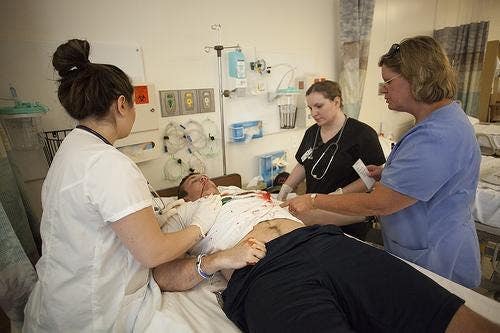7 Places DNPs Work

Hospitals
With their combination of experience and advanced education, DNPs often work in high-pressure environments. Many advanced practice nurses thrive in hospitals, which can often be fast-paced, high-demand health care environments.
With your DNP degree, you can do more for patients and colleagues when you work in a hospital. If you become a psychiatric nurse practitioner, a pediatric endocrinology nurse, or another specialized professional, you can diagnose special needs patients or offer your knowledge on certain types of treatments. You can also apply some of your instructive experience by informing patients and their families about diagnoses and treatments and improving your facility’s educational approaches.
Internal Medicine Practices
If you are seeking a more intimate work environment where you can have a smaller pool of regular patients, an internal medicine practice may be a smart option. In this type of office, you will treat patients as part of an experienced and dedicated team of health care professionals who focus on diagnosing, preventing, and treating diseases in adults.
Once you have earned your doctorate, you may have opportunities to take on more of a management role. Not only do these positions offer higher salaries, but they also enable you to shape policies and practices while applying your advanced nursing experience.
Specialty Practices
Many DNP professionals adopt at least one area of research interest during their doctoral programs, and taking a position at a specialty practice can be a way to put your years of research and clinical experience to work. Whether you have chosen to focus on oncology, cardiology, or another specialized area, your knowledge will help patients and further research in your field of choice.
As the Michigan Center for Nursing explains, as a DNP professional, you may be able to apply scholarship while evaluating clinical outcomes. At a specialty practice, you will gain firsthand experience by turning years of research into clinical practice or doing your part to improve health care methods and practices in your field.
Autonomous Practices
For many advanced practice nurses with DNP degrees, the greatest career goal can be establishing their own practice instead of working under a doctor’s supervision. In many parts of the United States, you can make this dream a reality. As the American Association of Nurse Practitioners (AANP) explains, state law determines whether professionals with DNP degrees can set up autonomous practices. States ranging from Washington and Oregon to Arizona, New Mexico, Maine, and Vermont allow people with DNP degrees to practice without physician oversight.
With an autonomous practice, you will diagnose illnesses and injuries, interpret tests, treat patients, and prescribe medicine. In this role, you will put your many years of clinical practice to work, helping patients feel better and live healthier lives. If you establish an autonomous practice in an underserved part of the United States, you may work with patients who do not receive adequate levels of care, thereby applying your skills to communities that need your help the most.
Universities or Colleges
After spending years in both classroom and clinical settings uncovering the latest research and applying the most advanced medical techniques, you’ll have much information at your disposal. Whether you are a natural presenter at the front of a classroom or you feel the drive to share your extensive knowledge with the next generation of advanced practice nurses, teaching can be an attractive option. Some DNP professionals may opt to pursue teaching.
With your DNP degree, you will cover more than the basics only. Instead, you could teach high-level courses at the college or university level. You may also be able to take on a mentorship role, enabling you to work closely with some of your most inspiring students as you help them succeed in this important field.
As Nurse Journal explains, you can also decide to pursue a research career at the postsecondary level. Individuals may search for positions as nurse researchers, an opportunity that enables you to study pressing health issues in communities around the nation. As a DNP professional, you can turn that research into practice as you develop programs that help improve public health.
Health Care Administration Settings
As you gain years of experience as an advanced practice nurse, you may undoubtedly encounter policies that do not work well or witness facilities that need serious improvement. When you receive your DNP degree, you are in the position to use your ideas and experience to affect change.
For example, you may decide to take on an administrative role at a hospital or a health care facility. Here, you will shape policy and make certain that the health care system works as smoothly as possible for your community. When you work in administration, you will also be able to exercise your leadership skills, inspiring your colleagues to share your vision.
Health Care Policy Advocacy Organizations
If you have more ambitious goals in mind for health care leadership, you might consider taking on a political role. As a DNP professional, you will help to change preventive care models, shape health care coverage evolution, and move health care strategy in a progressive direction.
As requirements for and access to health insurance continue to evolve, your hands-on experience and high-level knowledge is essential. According to the Advance Healthcare Network, only about 1 percent of nurses have a doctorate. By working to change health care policy, you can advocate for patient populations in need while expanding the potential for your field.
Whether you decide to pursue an administrative track, prefer to teach aspiring nurses, or want to set up your own private practice, a DNP degree could open the door to many career opportunities. To learn more, visit Maryville University’s accelerated BSN to DNP program online.